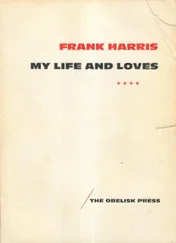Frank Harris - My life and loves Vol. 4
Здесь есть возможность читать онлайн «Frank Harris - My life and loves Vol. 4» весь текст электронной книги совершенно бесплатно (целиком полную версию без сокращений). В некоторых случаях можно слушать аудио, скачать через торрент в формате fb2 и присутствует краткое содержание. Жанр: Эротика, Секс, на английском языке. Описание произведения, (предисловие) а так же отзывы посетителей доступны на портале библиотеки ЛибКат.
- Название:My life and loves Vol. 4
- Автор:
- Жанр:
- Год:неизвестен
- ISBN:нет данных
- Рейтинг книги:4 / 5. Голосов: 1
-
Избранное:Добавить в избранное
- Отзывы:
-
Ваша оценка:
- 80
- 1
- 2
- 3
- 4
- 5
My life and loves Vol. 4: краткое содержание, описание и аннотация
Предлагаем к чтению аннотацию, описание, краткое содержание или предисловие (зависит от того, что написал сам автор книги «My life and loves Vol. 4»). Если вы не нашли необходимую информацию о книге — напишите в комментариях, мы постараемся отыскать её.
My life and loves Vol. 4 — читать онлайн бесплатно полную книгу (весь текст) целиком
Ниже представлен текст книги, разбитый по страницам. Система сохранения места последней прочитанной страницы, позволяет с удобством читать онлайн бесплатно книгу «My life and loves Vol. 4», без необходимости каждый раз заново искать на чём Вы остановились. Поставьте закладку, и сможете в любой момент перейти на страницу, на которой закончили чтение.
Интервал:
Закладка:
Was es zittert, was verlanget,
Weisst nur du, nur du allein!
Ich bin, ach! kaum alleine,
Ich wein, ich wein, ich weine,
Das Herz zerbricht in mir.
Wohin ich immer gehe
Wie weh, wie weh, wie wehe
Wird mir im Busen hier!
After that I feel inclined to quote here the earliest English poem that I know of, which is really fine:
What if Art be slowe,
Sweetlie let it growe,
As groweth tender grasse, 'Neath God's smalle rain.
But of shoutyng, strivyng, crying, roaryng, flghtyng, Waxeth nought save dust aloft, Upon the plaine.
I went to New York in 1914 when the World War came on, determined to make my way to China and Japan and spend three or four years in getting to know the languages, art and literature of those countries; for personal reasons I didn't go, so my life is maimed, and my life work, which I had thought I would make perfect, must be completed by some one else. Therefore I end with Browning's word in Andrea del Sarto:
"And thus we half-men struggle."
This always goes in my mind with the end of that great poem: … What would one have?
In heaven, perhaps, new chances, one more chance- Four great walls in the New Jerusalem, Meted on each side by the angel's reed, For Leonard, Rafael, Agnolo and me To cover-the three first without a wife, While I have mine! So-still they overcome Because there's still Lucrezia, — as I choose.
"Again the Cousin's whistle! Go, my Love."
CHAPTER II
Up to this time, I have said very little about my financial position. I must now make this omission good. From the time of taking over the Evening News in the early eighties, I had got into touch with finance in London. I not only knew the editors of the financial papers, but was a friend of both the owners, Macrae of the Financial Times and Harry Marks of the Financial News, and through my knowledge of South Africa and sympathy with the people, I had come into close relations with a good many of the South African financiers.
I had known Cecil Rhodes ever since the Colonial Conference in '87, as I have already narrated, and through him I came to know Alfred Beit, who somewhat later made himself, through the success of the gold mines of Johannesburg, one of the most important financiers in the world. About the same time I became friendly with Albert Ochs, who was the head of the famous diamond buying house of Hatton Gardens. He had a brother, James Ochs, who conducted the Paris business, and another younger brother of less importance; but Albert Ochs, in many respects, was very like Beit-a firstrate financial head. He had inherited half a million or so from his father in the diamond business, and while keeping on the old established trade in diamonds, bought an interest in certain gold mines in Johannesburg, and so came into the wider field of international finance.
We soon became intimate; I really liked Albert Ochs, and trusted him. I had made money with him more than once by getting articles in favor of his enterprises in all sorts of papers. Later I tried time and again to bring him into a union with Beit and Rhodes, which he infinitely desired, but that's another story to be told later.
Beit seemed to dislike Ochs, and one day told me a humorous story to account for his prejudice against him.
Beit and Wernher, it appears, used to lunch together at the Holborn Restaurant, and one day Beit noticed that old Ochs, Albert's father, had got a seat at the next table and seemed to be listening attentively to the private talk that went on between himself and Wernher. At this time Beit and Wernher, too, were diamond brokers in Hatton Gardens; in fact, in time, through Rhodes's help, they took over the whole business from Kimberley and ousted all competitors, including Ochs.
When Wernher went out, old Ochs bowed very politely to Beit and asked,
"Would you mind if I come and sit with you? I'm alone."
Beit said, "I'm going very soon, but if you would care to sit here, come." Ochs came over and took Wernher's vacant seat; Beit sat and talked with him wondering what he wanted.
Suddenly Ochs said, "Is Mr. Wernher coming back?"
"No, I do not think so," Beit replied. "He has had to go off on private business."
"Oh," said Ochs, "then may I help myself to some of the potatoes he has left?"
And as soon as Beit said, "Yes," he harpooned one or two of the cold potatoes and began to eat them. "Then I understood," said Beit, "that he had not come in the hope of finding out any secret, but simply, millionaire like, to realize a small economy." It was this story, I think, that first gave me the idea of my saying, "Means and meanness go together"; for a little later still I found the same characteristic just as fully developed in Alfred Beit, as I may tell in due course.
My friendship with Albert Ochs and Beit showed me a good deal of the inside of finance, and I knew that they would let me have the money to buy a paper as soon as I put a fair proposition before them.
One day in London I heard casually that the Saturday Review had just been sold to the son-in-law of the man who made Stephen's Ink. I had gone after the Saturday years before and was assured by Mr. Beresford Hope himself that if the sale of it were ever mooted, I should have the first refusal. Now, some years after his death, I found it had been sold by his children for a paltry thousand pounds. I went down at once to the office and saw the owner, Lewis Edmunds, Q.C., who knew no more about literature than he knew about skyscrapers. He told me that the paper was not for sale, but he would be willing to consider an offer. At once I said, "All right, I will give you a pound for every reader of the Saturday Review, taking the average of the last three weeks. I will pay you ten per cent down and the balance within a fortnight."
"Will you take our figures for the sales?" he asked.
"Certainly," I replied. Forthwith he rang a bell and ordered the old bookkeeper who came in to say what the average sales had been for the last three weeks. In ten minutes the figures were on the table. The average sales were 5,600. At once I gave him my check for five hundred and sixty and a promise to pay the remainder within a fortnight, against his written undertaking to hand me over the journal-and I went out of the office the probable owner of the Saturday Review.
When I thought the matter over I realized that I possibly hadn't more than five hundred pounds in the bank, and so went out to get an extra hundred. I went to one friend after another and failed: A. was not in; B. was away on a holiday; C. would have to consult his wife as to the matter; but at last late in the evening I fell across Brandon Thomas, the actor and playwright, and told him why I had come. He said, "I will lend you one thousand pounds on condition I may have a sixth-share in the venture." I gave him the undertaking, and a couple of years afterwards he got five thousand pounds for his sixth-share.
The purchase of the Saturday Review put me on my feet in every sense. Just as everyone had found that the step from the Evening News to the Fortnightly Review was a step up for me, so from the Fortnightly Review to the ownership and editorship of the Saturday Review was again a big step up. The losing of the Fortnightly Review did me good: it made me resolve to edit the Saturday Review as well as I could. So I sat down to plan the ablest possibly weekly: first of all, the staff must be better than the best hitherto.
I thought I had fewer prejudices than most men, and a better understanding of greatness than any editor in London, and so I set myself to pick the ablest.
To my friend Runciman I had promised the place of musical critic and my assistant. The first man I wrote to was George Bernard Shaw. He was at that time writing musical articles on the World for four pounds a week. I wrote to him that music was not the forte of the man who had written Widowers'
Читать дальшеИнтервал:
Закладка:
Похожие книги на «My life and loves Vol. 4»
Представляем Вашему вниманию похожие книги на «My life and loves Vol. 4» списком для выбора. Мы отобрали схожую по названию и смыслу литературу в надежде предоставить читателям больше вариантов отыскать новые, интересные, ещё непрочитанные произведения.
Обсуждение, отзывы о книге «My life and loves Vol. 4» и просто собственные мнения читателей. Оставьте ваши комментарии, напишите, что Вы думаете о произведении, его смысле или главных героях. Укажите что конкретно понравилось, а что нет, и почему Вы так считаете.






![William Frith - John Leech, His Life and Work. Vol. 1 [of 2]](/books/747171/william-frith-john-leech-his-life-and-work-vol-thumb.webp)
![William Frith - John Leech, His Life and Work, Vol. 2 [of 2]](/books/748201/william-frith-john-leech-his-life-and-work-vol-thumb.webp)




